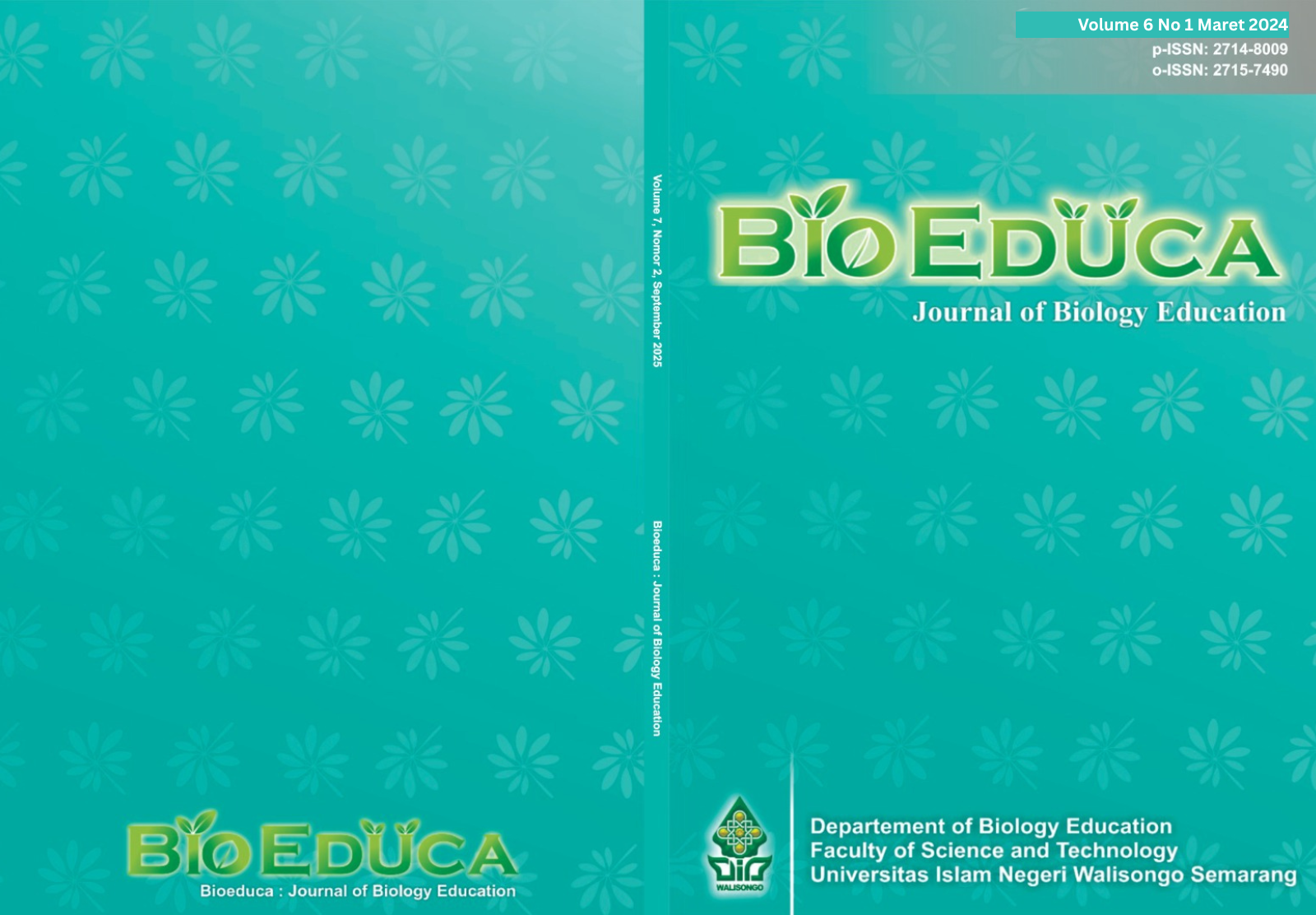The Effect of the Reading Concept Map Reciprocal Teaching (Remap RT) Learning Model on Students' Concept Understanding and Learning Interest in the Nervous System Sub-Material
Main Article Content
Abstract
Downloads
Article Details
The copyright of the received article shall be assigned to the journal as the publisher of the journal. The intended copyright includes the right to publish the article in various forms (including reprints). The journal maintains the publishing rights to the published articles. Authors are allowed to use their articles for any legal purposes deemed necessary without written permission from the journal with an acknowledgment of initial publication to this journal.

This work is licensed under a Creative Commons Attribution-ShareAlike 4.0 International License.
References
Adodo, S. O. & Gbore, L. O. (2012). Prendicition of attitude and interest of science students of different ability on their academic performance in basic science. International Journal of psychology and Counselling, 4(6), 68-72.
Afdhal, M. (2015). Menumbuhkan kemampuan berpikir kritis matematis dan antusiasme belajar melalui pendekatan reciprocal teaching. In Makalah Disajikan Dalam Seminar Nasional Matematika Dan Pendidikan Matematika UNY.
Aflalo, E. (2021). Students Generating Questions as a Way of Learning. Active Learning in Higher Education, 22 (1), 63–75.
Ahmad, M. Y., & Tambak, Y. (2017). Hubungan Metode Tanya Jawab Dengan Minat Belajar Peserta Didik Pada Mata Pelajaran Pendidikan Agama Islam. Jurnal Pendidikan Agama Islam Al-Thariqah, 2 (1): 89–110.
Alam, Y. (2018). Dampak Minat Belajar Terhadap Prestasi Belajar Siswa Pada SMK PGRI 1 Palembang. MOTIVASI: Jurnal Manajemen dan Bisnis, 3(2), 573-591.
Andhika, M. R. (2014). Pengaruh strategi pembelajaran konstruktivis dan minat belajar terhadap hasil belajar bahasa Arab siswa kelas VIII Madrasah Tsanawiyah Ulumuddin Uteunkot Cunda Lhokseumawe (Doctoral dissertation, Pascasarjana UIN Sumatera Utara).
Anggraeni, A. (2019). Urgensi Penerapan Pendekatan Konstruktivisme pada Pembelajaran PKn SD untuk Meningkatkan Minat Belajar Siswa. Pelita Bangsa Pelestari Pancasila, 14(2).
Darmayanti, N. W. S., Sadia, W., & Sudiatmika, A. A. I. A. R. (2013). Pengaruh model collaborative teamwork learning terhadap keterampilan proses sains dan pemahaman konsep ditinjau dari gaya kognitif. Jurnal Pendidikan dan Pembelajaran IPA Indonesia, 3(1).
Dharma, S. A. (2019). Analisis Kelayakan Usaha Perikanan Tangkap Purse Seine Di Pelabuhan Perikanan Banyusangka, Kecamatan Tanjung Bumi, Kabupaten Bangkalan, Jawa Timur (Doctoral dissertation, Universitas Brawijaya).
Hayati, N., & Harianto, F. (2017). Hubungan Penggunaan Media Pembelajaran Audio Visual dengan Minat Peserta Didik pada Pembelajaran Pendidikan Agama Islam di SMAN 1 Bangkinang Kota. Al-Hikmah: Jurnal Agama Dan Ilmu Pengetahuan, 14(2), 160-180.
Hefliza, B. (2020). Implementasi E-Learning Menggunakan Zoom Terhadap Pemahaman Konsep Peserta Didik Ditinjau Dari Gender Pada Mata Pelajaran Biologi Kelas XI di Sma Negeri 1 Padang Cermin. (Doctoral Dissertation, Uin Raden Intan Lampung).
Hemayanti, K. L., Muderawan, I. W., & Selamat, I. N. (2020). Analisis minat belajar siswa kelas Xi Mia pada mata pelajaran kimia. Jurnal Pendidikan Kimia Indonesia, 4(1), 20-25.
Irwan, I. (2018). Penerapan Metode Diskusi Dalam Peningkatan Minat Belajar. IQRO: Journal of Islamic Education, 1 (1): 43–54.
Khaerunnas, H., & Rafsanjani, M. A. (2021). Pengaruh pengenalan lapangan persekolahan (PLP), minat mengajar, dan prestasi belajar terhadap kesiapan menjadi guru bagi mahasiswa pendidikan ekonomi. Edukatif: Jurnal Ilmu Pendidikan, 3(6), 3946-3953.
Lestari, D., Mulyani, S., & Susanti, R. (2016). Pengembangan perangkat blended learning sistem saraf manusia untuk meningkatkan keterampilan berpikir kritis. Journal of Innovative Science Education, 5(1), 83-93.
Nugraha, D. A., Dimas, A., Cari, C., Suparmi, A., & Sunarno, W. (2019). Meta Analisis Pengaruh Model Pembelajaran POE Terhadap Pemahaman Konsep. In Prosiding SNFA (Seminar Nasional Fisika Dan Aplikasinya).
Nuryani, N., Saifuddin, M. F., Imana, A. H. N., Istiqomah, D., Haningsih, M. S., Ardani, V. P., & Ma'rifah, D. R. (2020). REMAP-RT in the Circulatory System Material to Improve Students Cognitive Learning Output. Mangifera Edu, 5(1), 55-63.
Pujiayanto, S. (2022). Menjelajah Dunia Biologi 3. Solo: PT Tiga Serangkai Pustaka Mandiri
Qorimah, E. N., & Abduh, M. (2021). Komparasi penggunaan media pembelajaran wayang pahlawan dan cerita pahlawan terhadap hasil belajar kognitif siswa sekolah dasar. Jurnal Basicedu, 5(4), 2062-2068.
Rahmadhani, M., & Lestari, N. S. (2021). Sharing For Caring: Bersama Berbagi Ilmu Dan Manfaat Dalam Pembelajaran Bahasa Inggris Melalui Games. Jurnal Pengabdian Kepada Masyarakat, 2(1), 41-51.
Ramadani, S. D. (2021). Apakah Model Pembelajaran Reciprocal Teaching dapat Meningkatkan Minat Belajar dan Hasil Belajar Biologi Siswa SMA?(Does Reciprocal Teaching Learning Model can Increase Learning Interest and Biology Learning Outcomes of High School Students). BIODIK, 7(3), 123-132.
Slameto. (2010). Belajar dan FaktorFaktor yang Mempengaruhinya. Jakarta: Rineka Cipta.
Sumiartini, N., Ardana, I. M., & Ariawan, I. P. W. (2018). Pengaruh Model Pembelajaran Reading Concept Map Reciprocal Teaching (REMAP RT) Terhadap Pemahaman Konsep Matematika Siswa Kelas VIII SMP Negeri 1 Singaraja. Jurnal Pendidikan Matematika Undiksha, 9(1), 73-82.
Sumiartini, N., Ardana, I. M., & Ariawan, I. P. W. (2018). Pengaruh Model Pembelajaran Reading Concept Map Reciprocal Teaching (REMAP RT) Terhadap Pemahaman Konsep Matematika Siswa Kelas VIII SMP Negeri 1 Singaraja. Jurnal Pendidikan Matematika Undiksha, 9(1), 73-82.
Tavsancil, E., Yildirim, O., & Demir, B. S. (2019). Direct and Indirect Effects of Learning Strategies and Reading Enjoyment on PISA 2009 Reading Performance. Eurasian Journal of Educational Research, (82), 169–190.
Ummiyati, U., Hasan, S., & Bahtiar, B. (2022). Pengaruh Model Pembelajaran Reading Questioning And Answering (RQA) Berbantuan Aplikasi Kipin School Terhadap Hasil Belajar Kognitif Siswa Kelas VII Smp Negeri 3 Kota Ternate. Jurnal Bioedukasi, 5(1), 10-17.
Yunita, F. F. (2019). Hubungan Interaksi Teman Sebaya dengan Minat Belajar Siswa (Doctoral dissertation, Universitas Negeri Padang).
Zubaidah, S., Mahanal, S., Pangestuti, A. A., & Mistianah, M. (2016). Ragam Peta Konsep Penunjang Model Pembelajaran Biologi Berbasis Remap Coople. In Prosiding Seminar Nasional Biologi.

